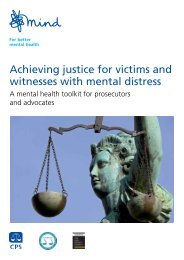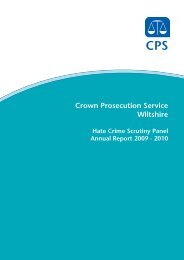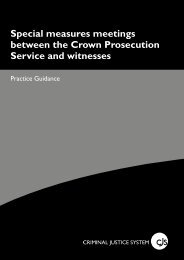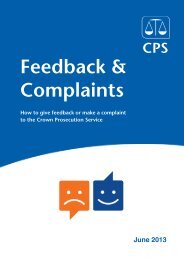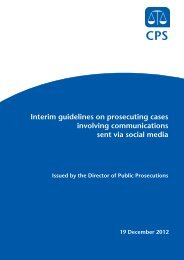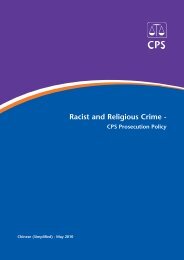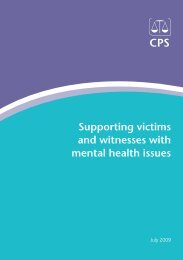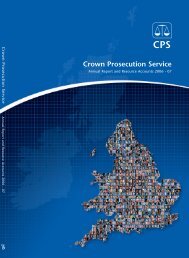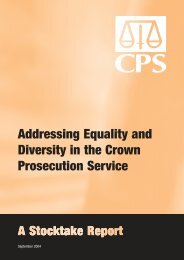CPS Policy on Prosecuting Criminal Cases Involving Children and ...
CPS Policy on Prosecuting Criminal Cases Involving Children and ...
CPS Policy on Prosecuting Criminal Cases Involving Children and ...
Create successful ePaper yourself
Turn your PDF publications into a flip-book with our unique Google optimized e-Paper software.
How we decideWe think carefully about the effect <strong>on</strong> children <strong>and</strong> their families when we make thesedecisi<strong>on</strong>s. The younger a child is the more careful we will be; Prosecutors' Pledge: 'Takeinto account the impact <strong>on</strong> the victim or their family when making a charging decisi<strong>on</strong>'.There may be several children involved. What is best for <strong>on</strong>e of them may not be best forall of them.There will often be adults involved as well <strong>and</strong> we have to think how our decisi<strong>on</strong>s willaffect them.If a crime against a child is serious, <strong>and</strong> the evidence is str<strong>on</strong>g enough, we will nearlyalways prosecute. We will always think about the effect <strong>on</strong> that child of going to court, <strong>and</strong>make sure there is good support before, during <strong>and</strong> after the trial.Listening to childrenWe will always listen carefully to what children have to say about their case <strong>and</strong> aboutgoing to court.<strong>Children</strong> can give us their views by telling the police officer, witness supporter or witnesscare officer, who will pass them <strong>on</strong> to us.In a small number of cases we may have a meeting with a child <strong>and</strong> his or her parents orcarers to discuss their views or explain why we have made certain decisi<strong>on</strong>s.<strong>Children</strong>'s views are important, but in the end we have to make the final decisi<strong>on</strong> in cases.We will listen carefully, but we cannot promise to do what children want all the time.Some comm<strong>on</strong> c<strong>on</strong>cernsVery young childrenThe younger children are, the more careful we have to be about deciding whether it is rightto ask them to become involved in a criminal trial.There are no fixed rules about how old children must be before they can give evidence orbefore we will prosecute a case, but there are practical as well as welfare c<strong>on</strong>cerns.All witnesses have to be able to underst<strong>and</strong> questi<strong>on</strong>s <strong>and</strong> be able to give replies that canbe understood; Secti<strong>on</strong> 53 Youth Justice <strong>and</strong> <strong>Criminal</strong> Evidence Act 1999 sets the test forwhether a witness is competent to give evidence. In some areas of the country an'intermediary', who is specially trained to help children communicate, can help them tounderst<strong>and</strong> <strong>and</strong> answer questi<strong>on</strong>s, if they would find this difficult without help.We will always look at the help we can give children when we decide whether we canprosecute cases.Parents' c<strong>on</strong>cernsParents or carers may be c<strong>on</strong>cerned about how their children will cope at court. We canhelp by giving them informati<strong>on</strong> about the help available for children. There is more detailin the secti<strong>on</strong> <strong>on</strong> supporting child witnesses (below).



